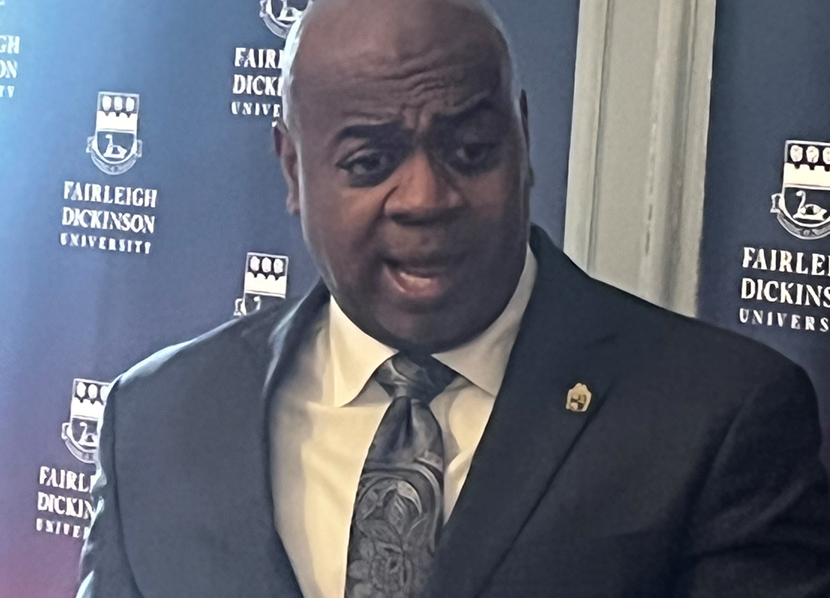
Newark’s reputation statewide is not a good one. That’s just reality.
Ras Baraka knows that. And given the fact Baraka is not just the city’s mayor, but also a 2025 gubernatorial candidate, the reputation of the state’s largest city is quite relevant.
It was also one of the first questions posed to the mayor Tuesday afternoon when he took part in a “gubernatorial conversation” at Fairleigh Dickinson University in Madison. The university is inviting all announced – and potential – candidates to campus to discuss issues. This week was Baraka’s turn.
The host was Peter Woolley, a long-time political science professor at the school, and he quickly brought up how the city is perceived.
He began with good news. The crime rate in Newark is much lower than many similar-sized cities around the country.
This is brought out by FBI stats and various other studies. Woolley, in fact, noted that he just spent a weekend in Nashville, Tenn, which he said has a much higher violent crime rate than Newark.
Some national studies on crime can’t be compared. because they employ different metrics, but in all studies Newark’s violent crime rate does not make the top 20 of dangerous cities across the nation.
Still, the negative perception of Newark persists – a lingering memory, perhaps, dating back to the riots of 1967.
When Woolley asked the mayor for his take, Baraka said, “You got to ask your journalist friends about that.”
That was not a real answer, but in a conversation afterwards, I asked the mayor about race.
Baraka acknowledged that some in suburbia see a mostly black city and think the worst regarding crime.
He said that is a continuing challenge, but he also noted that this is more of an older generation thing. That would be those old enough to remember the riots, or at least, their immediate aftermath.
The state’s younger generation, Baraka said, does not necessarily think that way.
As a candidate for governor, Baraka wants to represent Newark, other cities, but also the “leafy suburbs,” which is how they were described.
“The issues that we deal with in Newark are statewide issues,” he said, ticking off housing, education and affordability.
While people may look at Newark as some type of anomaly, Baraka contended:
“All the problems the state has are pronounced in the city of Newark.”
So, he inferred, who better to deal with them?
The race for governor is still more than a year away.
So, obviously, the mayor was asked about the current Democratic battle between Andy Kim and Tammy Murphy.
This involves not only the one-on-one race, but a pending federal suit challenging the “county line,” a primary ballot system that favors candidates backed by party leaders.
Baraka was asked if he had a “horse” in the Senate fight. He does not.
But he also said reform in how ballots are designed in New Jersey is overdue.
Baraka called the current system “just a hodgepodge, a mess.”
Pointing out that it makes no difference who is running, Baraka said the traditional way of doing things in New Jersey is “common sense, un-democratic.”
(Visited 56 times, 56 visits today)
Newark Mayor Ras Baraka has recently expressed his support for ballot reform in New Jersey, stating that it is “long overdue.” This comes after a report by Insider NJ highlighted the need for changes to the state’s ballot system in order to make it more fair and transparent.
Baraka, who has been a vocal advocate for voting rights and electoral reform, believes that the current ballot system in New Jersey is outdated and in need of an overhaul. He argues that the current system often disenfranchises voters, particularly those in marginalized communities, and makes it difficult for candidates who are not part of the political establishment to gain access to the ballot.
One of the key issues that Baraka has identified is the high threshold for getting on the ballot in New Jersey. Currently, candidates need to gather a certain number of signatures from registered voters in order to qualify for the ballot. This process can be time-consuming and costly, making it difficult for grassroots candidates to compete with well-funded incumbents.
Baraka has called for a more streamlined and equitable ballot access process, one that would make it easier for all candidates to participate in the democratic process. He has also proposed measures such as ranked-choice voting and public financing of elections as ways to level the playing field and ensure that all voices are heard.
The mayor’s stance on ballot reform has been met with both praise and criticism. Supporters argue that his proposals would help to increase voter turnout and promote a more diverse and representative political landscape. Critics, however, have raised concerns about the potential costs and logistical challenges of implementing such reforms.
Overall, Baraka’s advocacy for ballot reform reflects a growing recognition of the need to modernize and improve our electoral systems. As discussions around voting rights and democracy continue to gain momentum, it is likely that more politicians and activists will join in calling for changes to ensure a fair and inclusive electoral process for all.
